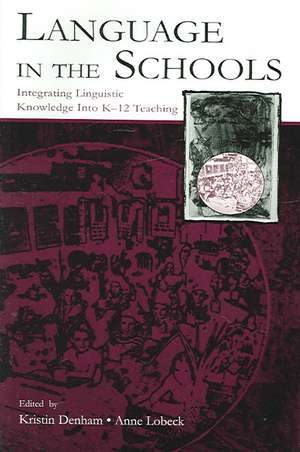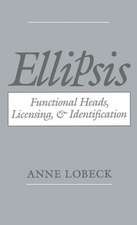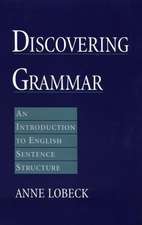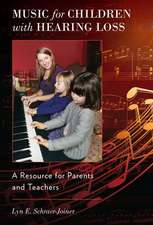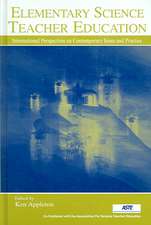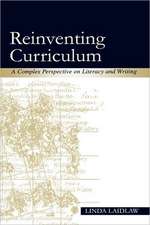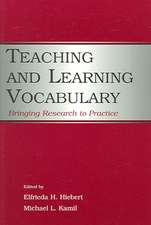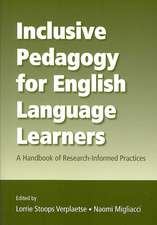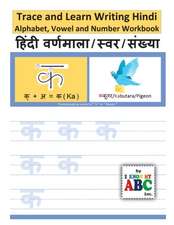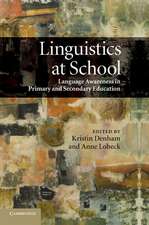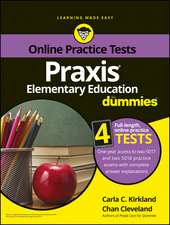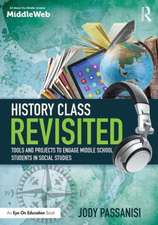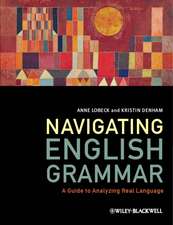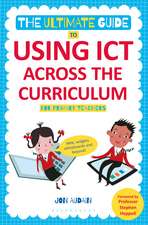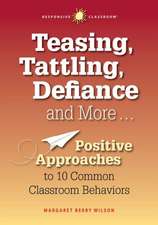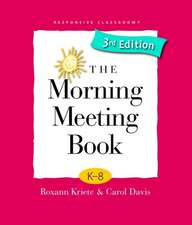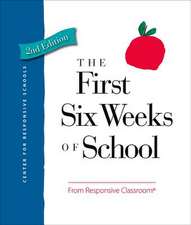Language in the Schools: Integrating Linguistic Knowledge Into K-12 Teaching
Editat de Kristin Denham, Anne Lobecken Limba Engleză Paperback – 20 iul 2005
*What aspects of linguistic knowledge are most useful for teachers to know?
*What kinds of activities and projects are most effective in introducing those aspects of linguistic knowledge to K-12 students?
The volume focuses on how basic linguistic knowledge can inform teachers' approaches to language issues in the multicultural, linguistically diverse classroom. The text also includes examples of practical applications of language awareness to pedagogy, assessment, and curriculum construction, which support the current goals of language arts, bilingual, and ESL education.
Language in the Schools: Integrating Linguistic Knowledge Into K-12 Teaching contributes to the resources on linguistics and education by taking prospective teachers beyond basic linguistics to ways in which linguistics can productively inform their teaching and raise their students' awareness of language. It is intended as a text for students in teacher education programs who have a basic knowledge of linguistics.
Preț: 292.08 lei
Preț vechi: 374.07 lei
-22% Nou
Puncte Express: 438
Preț estimativ în valută:
55.89€ • 59.77$ • 46.60£
55.89€ • 59.77$ • 46.60£
Carte tipărită la comandă
Livrare economică 17 aprilie-01 mai
Preluare comenzi: 021 569.72.76
Specificații
ISBN-13: 9780805848144
ISBN-10: 0805848142
Pagini: 290
Dimensiuni: 152 x 229 x 17 mm
Greutate: 0.41 kg
Ediția:1
Editura: Taylor & Francis
Colecția Routledge
Locul publicării:Oxford, United Kingdom
ISBN-10: 0805848142
Pagini: 290
Dimensiuni: 152 x 229 x 17 mm
Greutate: 0.41 kg
Ediția:1
Editura: Taylor & Francis
Colecția Routledge
Locul publicării:Oxford, United Kingdom
Public țintă
ProfessionalCuprins
Contents: Preface. Part I: How Knowledge of Language Can Inform Teachers in Multicultural, Linguistically Diverse Classrooms. J. Baugh, Linguistics and Education in Multilingual America. J.S. Lee, Embracing Diversity Through the Understanding of Pragmatics. S. Burt, H. Yang, Growing Up Shifting: Immigrant Children, Their Families, and the Schools. K.A. Remlinger, Language and Gender Matters in the Classroom. A.B. Wassink, "My Teacher Says...," Mastery of English and the Creole Learner. J. Ann, L. Peng, The Relevance of Linguistic Analysis to the Role of Teachers as Decision Makers. L.S. Mancini, A Positive Sign: An Overview of the Benefits of Signing in the Classroom. A. Lobeck, A Critical Approach to Standard English. P. MacGregor-Mendoza, Bilingualism: Myths and Realities. R. Bayley, S.R. Schecter, Spanish Maintenance and English Literacy: Mexican-Descent Children's Spanish and English Narratives. Part II: Integrating Knowledge of Language Into K-12 Teaching. A. Curzan, Spelling Stories: A Way to Teach the History of English. K. Denham, Teaching Students About Language Change, Language Endangerment, and Language Death. J.M.D. Higgins, Language as a Reflection of Our Social and Physical World: What We Can Learn From Metaphor. R.S. Wheeler, Contrasive Analysis and Codeswitching: How and Why to Use the Vernacular to Teach Standard English. K. Hazen, English LIVEs: Language in Variation Exercises for Today's Classrooms. P.A. Dunn, K. Lindblom, Developing Savvy Writers by Analyzing Grammar Rants. D.J. Napoli, Linguistics as a Tool in Teaching Fiction Writing. T.T.N. Hung, Applications of Corpus Linguistics in the English Language Classroom. A.M. Nemoianu, English Gairaigo: Learning About Language Structure From the Margins of Japanese. A. Curzan, Opening Dictionaries to Investigation.
Recenzii
"This volume would make an excellent choice for a school-wide study group for professional development of teachers, especially for an elementary school that has a diversity of languages spoken within the community. Editors Denham and Lobeck and their colleagues have built an excellent argument for increasing the linguistic knowledge of teachers. As American classrooms continue to expand in diversity, these tools will become vital to the language of learning."—PsycCRITIQUES
"...a great deal of valuable information to encourage teachers to think in more global terms about language and language use. The focus on diversity of the student population and diversity of language is clear and needed."—Nancy L. Hadaway, University of Texas at Arlington
"The representative topics they explore are both stimulating and relevant to educators in today's teaching environments, and the suggested activities are, for the most part, realistic and exciting for teachers. Language in the Schools is successful in helping teachers see how to investigate and celebrate language(s) in their classrooms--whether they teach social studies, geometry, life science, or English. The book is a valuable contribution toward increasing awareness of language's role in classroom learning."--TESL-EJ, March 2007, Volume 10, Number 4
"...a great deal of valuable information to encourage teachers to think in more global terms about language and language use. The focus on diversity of the student population and diversity of language is clear and needed."—Nancy L. Hadaway, University of Texas at Arlington
"The representative topics they explore are both stimulating and relevant to educators in today's teaching environments, and the suggested activities are, for the most part, realistic and exciting for teachers. Language in the Schools is successful in helping teachers see how to investigate and celebrate language(s) in their classrooms--whether they teach social studies, geometry, life science, or English. The book is a valuable contribution toward increasing awareness of language's role in classroom learning."--TESL-EJ, March 2007, Volume 10, Number 4
Descriere
Language in the Schools: Integrating Linguistics Knowledge Into K-12 Teaching addresses two important questions:
*What aspects of linguistic knowledge are most useful for teachers to know?
*What kinds of activities and projects are most eff
*What aspects of linguistic knowledge are most useful for teachers to know?
*What kinds of activities and projects are most eff
